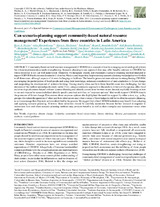Can scenario-planning support community-based natural resource management? Experiences from three countries in Latin America
Autor
Waylen, Kerry A.
Martín-Ortega, Julia
Blackstock, Kirsty L.
Avendaño Uribe, Bryan E.
Basurto Hernández, Saúl
Bertoni, María Belén
Lujan Bustos, M.
Cruz Bayer, Alejandra Xóchitl
Farah Quijano, Maria Adelaida
Ferrelli, Federico
Fidalgo, Guillermo Luis
Hernández López, Israel
Huamantinco Cisneros, María Andrea
London, Silvia
Maya Vélez, Diana L.
Ocampo-Díaz, Natalia
Ortiz-Guerrero, Cesar E.
Pascale, Juan Carlos
Perillo, Gerardo M. E.
Piccolo, M. Cintia
Pinzón Martínez, Lina N.
Rojas, Mara L.
Scordo, Facundo
Vitale, Valeria
Zilio, Mariana I.
Escalante Semerena, Roberto I.
Editor
MDPIFecha
2015Materia
ArgentinaClimate change
Colombia
Community-based conservation
Futures thinking
Mexico
Participation
Scenario methods
Wicked problems
METS:
Mostrar el registro METSPREMIS:
Mostrar el registro PREMISMetadatos
Mostrar el registro completo del ítemResumen
Community-based natural resource management (CBNRM) is a concept critical to managing social-ecological systems but whose implementation needs strengthening. Scenario planning is one approach that may offer benefits relevant to CBNRM but whose potential is not yet well understood. Therefore, we designed, trialed, and evaluated a scenario-planning method intended to support CBNRM in three cases, located in Colombia, Mexico, and Argentina. Implementing scenario planning was judged as worthwhile in all three cases, although aspects of it were challenging to facilitate. The benefits generated were relevant to strengthening CBNRM: encouraging the participation of local people and using their knowledge, enhanced consideration of and adaptation to future change, and supporting the development of systems thinking. Tracing exactly when and how these benefits arose was challenging, but two elements of the method seemed particularly useful. First, using a systematic approach to discuss how drivers of change may affect local social-ecological systems helped to foster systems thinking and identify connections between issues. Second, explicitly focusing on how to use and respond to scenarios helped identify specific practical activities, or “response options,” that would support CBNRM despite the pressures of future change. Discussions about response options also highlighted the need for support by other actors, e.g., policy groups: this raised the question of when and how other actors and other sources of knowledge should be involved in scenario planning, so as to encourage their buy-in to actions identified by the process. We suggest that other CBNRM initiatives may benefit from adapting and applying scenario planning. However, these initiatives should be carefully monitored because further research is required to understand how and when scenario-planning methods may produce benefits, as well as their strengths and weaknesses versus other methods.

